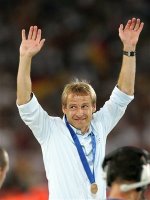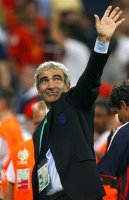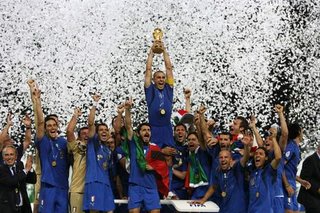I guess in a world where Steve Nash can win two straight MVP awards, Zinedine Zidane can win the Golden Ball as the World Cup's best player. Let's take a look at Zidane's tournament and Fabio Cannavaro's tournament and you can decide who should have received the honor.
Zidane and France slogged through the group stage, finishing second in Group G to, ahem, Switzerland. In fact, the only group game the French won was against mighty Togo, with Zidane riding the pine after accumlulating two yellow cards in the first two matches.
In the second round and quarterfinals, Zidane turned it on. There's no arguing that. He first played a dyamic attacking-midfield against Spain, scoring a goal to ice the win, and then orchestrated an upset of Brazil, assisting on that game's only goal.
To my mind, he played well enough (though not as he had vs. Brazil) against Portugal and continued to look dangerous at times in the final, though he was unable to crack the Italian defense for the game-winner before he headbutted Materazzi.
Let's recap: Zizou began the Cup sluggishly, then turned it on through the elimination stages before finishing on a classless, humiliating note.
On the other hand, Fabio Cannavaro, who finished second in the voting, was on his game from the start. The Italian captain and central defender anchored a back line that didn't allow the opposing team to score until Zidane hit a PK in the final. Cannavaro was at once a free safety -- anticipating the play and darting about the field to win balls played over the top -- and a linebacker -- holding his ground in individual defending and running down attacker after attacker while timing his tackles so as not to foul -- all in a 5'9" body. And unlike Zidane, Cannavaro kept his head throughout the tournament, fearlessly and confidently leading the Azzurri to the ultimate prize.
As Franz Beckenbauer said, this tournament was without one overwhelming player. But certainly the man who was on his game from the start and quarterbacked the best defensive unit, in a Cup that was all about defense no less, should be regarded as the tournament's best.
By arguing for him, though, I'm taking the low road. But as a good captain should, Cannavaro took the high road, saying he's quite pleased with the trophy he
did win.








